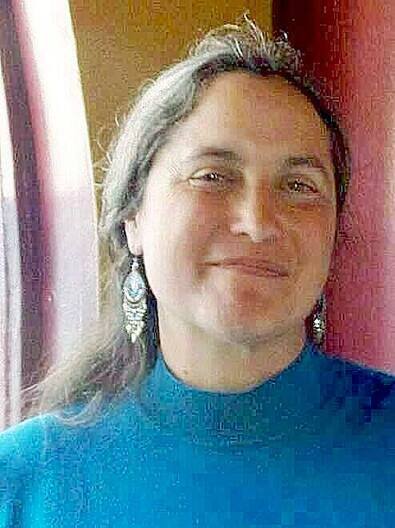Celebrating Raina and Her 25 years at BRT
February 27, 2024

So important is Raina Megert to BRT, she is simply the lifeblood of our organization. She is indispensable and vitally important to the continuing success and existence of our program.
Raina does it all as our comp controller, emergency response point person, program manager, finance analyst, and employee support/guidance counselor. Always one to jump right in to help and assist where there is a need, she is the calm, pleasant, and steady constant to our program’s operation. She sets the bar of excellence and we are greatly blessed with her as our colleague and friend.
BRT Researcher Captures Grant Prize in 2023 NAEP Automated Scoring Challenge for NAEP Mathematics items 2023 NCES Challenge
Summer 2023

In informing Dr. Zopluoglu of his win, Daniel J. McGrath, Ph.D., the Delegated Authority of Associate Commissioner Assessment Division for the National Center for Education Statistics, wrote, “Originally, we had planned to name a single Grand Prize winner. However, two entrants’ work stood out. In each of the top models, the agreement with human scorers was so similar that we wanted to acknowledge the outstanding work of each of those teams. Your team’s submission was one of the strongest, and we are pleased to inform you that your team is among the winners.”
McGrath explained that the NCES, challenge is part of their efforts to modernize their system by incorporating data science and machine learning into the National Center on Education Statistics’ operational activities. He wrote, that NCES “began work on this challenge with a question: ‘Can someone do this work at a level that would allow NAEP to maintain its status as the gold standard?’ … Thanks to your hard work, we can be confident that the work is doable, and we can point to two models of excellence as evidence.”
In describing his work, Zopluoglu explained that NCES opened this competition in the spring of 2023 and released some datasets, inviting researchers across the country to submit predictions for machine scoring of ten open-ended constructed response math items where the kids provided a textual response and explained their reasoning for each math problem. More than 250,000 individual responses were originally scored by human raters for these ten math items. Zopluoglu said that he trained some models using the open-source advanced NLP models and the models performed great, yielding scores very similar to those obtained by human raters.
Zopluoglu further noted his appreciation for the support he received on this project from BRT and the University of Oregon’s Research Advanced Computing Services and more specifically the UO’s computing cluster Talapas. “Without these supports,” he explained, “There is no way I could train so many models that required specialized software in a short amount of time. Talapas made it possible. Without the support from BRT and Talapas, this wouldn’t happen.”
Zopluoglu’s ground-breaking data science / machine learning work is part of his ongoing research with real-world applications. We look forwards to sharing similar machine-scoring innovations through the CBMSkills and WriteRightNow! applications in the near future.
Math Scoring Data ChallengePR Newswire
Shawn Irvin Promoted to Research Associate Professor
July 2023

In further recognition of his budding presence as a researcher with an independent line of research and development, P. Shawn Irvin, Ph.D., was recently promoted to the rank of Research Associate Professor in the College of Education. Dr. Irvin has worked for Behavioral Research and Teaching (BRT) at the University of Oregon since 2011––initially as a doctoral student (2011-2015), and then as Research Associate (2015-2018) and Research Assistant Professor (2018-2023), prior to this most recent promotion.
He is current Co-Principal Investigator on a recently-renewed contract with the Virginia Department of Education (VDOE; #7.13-PR9218984-2020; 9/2023 – 8/2026, $1,900,000 total) tasked with development and validation of the large-scale Virginia Alternate Assessment Program (VAAP), targeted for students with significant cognitive disabilities (SWSCD), which represent 1% of students in state accountability systems.
Celebrating 30 years at BRT
February 6, 2023
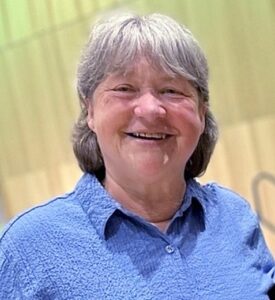
“How did it get so late so soon? It’s night before it’s afternoon. December is here before it’s June. My goodness how the time has flewn. How did it get so late so soon?” -Dr. Seuss
Denise Swanson: Looking back, it doesn’t seem so long ago I was starting at Behavioral Research and Teaching. Thirty years compressed into a wealth of wonderful memories, experiences, and amazing colleagues who have grown into my family of friends (friemily).
It is both rare and wonderful to be able to work at one place for 30 years and still love the people and work that you do. The gift is not lost on me and I feel very blessed to have had this opportunity and experience.
Distinguished Teacher Award Presented to Dr. Julie Alonzo
June 2022
Each year, the University of Oregon recognizes a select group of faculty for excellence in teaching. These awards are U of O’s highest teaching honor, with nominations coming from students, faculty, and staff. This year’s recipient for Distinguished Teaching Award goes to BRT’s own, Dr. Julie Alonzo.
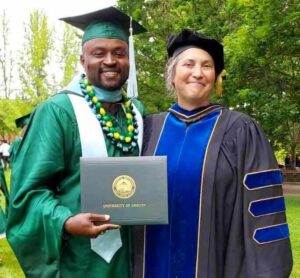
The award winners, their approach, and their caring for students are central to U of O’s mission that is built on teaching excellence and academic leadership in scholarly endeavors. And to do what these instructors have done under the trying circumstances of the pandemic only adds to their accomplishments on behalf of our students.
“Julie is an extraordinary teacher. The classes I took with her were engaging, informative, and interactive,” noted Christine Moses. “Her ability to move and support students throughout the class across multiple disciplines is a testament to her breadth of knowledge and her willingness to learn alongside her students.”
Brant Lloyd observed, “Julie is also outstanding in understanding the students she works with and what their needs are. I’ve spoken with her about the challenges a professional student faces and she has had solutions for overcoming whatever might have kept me from moving forward and getting things done. I can’t say enough about how Julie is a doer and helps others get things done.”
Congratulations Julie for a well deserved honor!Congratulations Julie, from all of us at BRT, for a well deserved honor!
Announcing New Faculty Hire – Dr. Julie Alonzo
March 2020
I am pleased to announce the hire of Dr. Julie Alonzo, currently a Research Associate Professor and Co-Director of Behavioral Research and Teaching (BRT) as Lecturer in EMPL, academic program director for the DEd program, and contributor to other EMPL leadership preparation programs. Julie will serve a vital role in anchoring the DEd program, in particular, and engaging in continuous improvement of the academic program. Many of you know Julie because of her illustrious career as a researcher and one of our emerging leaders in asynchronous on-line course development. For those of you who do not know Julie well, I will share some of her biography from our website.
Prior to coming to the UO to pursue her doctoral studies, Julie worked for 12 years as a secondary school teacher and administrator in California and earned her National Board for Professional Teaching Standards certification in Adolescent and Young Adulthood English Language Arts. A member of the Kansas Delaware tribe, she received her Ph.D. from our college in 2007. She has taught a variety of graduate-level courses for our college including Survey of Educational Research Methodology, Professional Writing, Action Research, Introduction to Research Methods, Measurement in Decision Making, Measurement and Assessment, Middle/Secondary Teacher Education Curriculum/Assessment Alignment, and Middle/Secondary Teacher Education Capstone Project. She has served on grant peer review panels for the U.S. Department of Education, the National Institute of Justice, and the National Science Foundation. Julie has published 18 articles in peer-reviewed journals, 8 book chapters, 118 technical reports, and has presented 57 papers at research conferences. She is a member of the Editorial Review Boards for Assessment for Effective Intervention, Educational Measurement: Issues and Practice, and Journal of Educational Measurement and regularly serves on grant review panels for the U.S. Department of Education. Welcome, Julie!
Randy Kamphaus, Dean, College of Education, University of Oregon
Celebrating 5 years at BRT
February 13, 2020
Rob Robinson, one of our Analyst Programmers, was recognized by the University of Oregon in the final months of 2019 for his five years of stellar service to UO.
Since coming to the University of Oregon from California State University, Fresno, Rob has both headed up both tech operations at BRT and taken the lead as the primary computer programmer supporting the widely-used easyCBM® system.
“Rob is an incredible colleague,” noted BRT co-Director Julie Alonzo. “He is meticulously careful in his work, a trait that is essential for a computer programmer, and he balances a variety of tasks with aplomb.”
“A few years ago,” she added, “our primary internal server died unexpectedly, and Rob saved the day by getting us up and running quickly and efficiently, all while minimizing the negative impact to our situation-critical functions.”
Like many in BRT, Rob is also an active volunteer, generously contributing many hours each month in service to community organizations and schools in the area.
Whether it’s protecting sensitive data and research projects, auditing and balancing our server usage to optimize user experience, or finding ways to improve and enhance the easyCBM system, Rob’s expertise and dedication to quality make him an invaluable member of the BRT family.
“I’ve come to depend on Rob’s detailed and well-reasoned approach to work,” Alonzo added. “He understands the incredible impact his work has on educators and students all across the country, and he goes the extra mile to maintain the trust people place in BRT and the educational software we provide.”
Joseph F.T. Nese Receives a Promotion to Research Associate Professor
June 2018
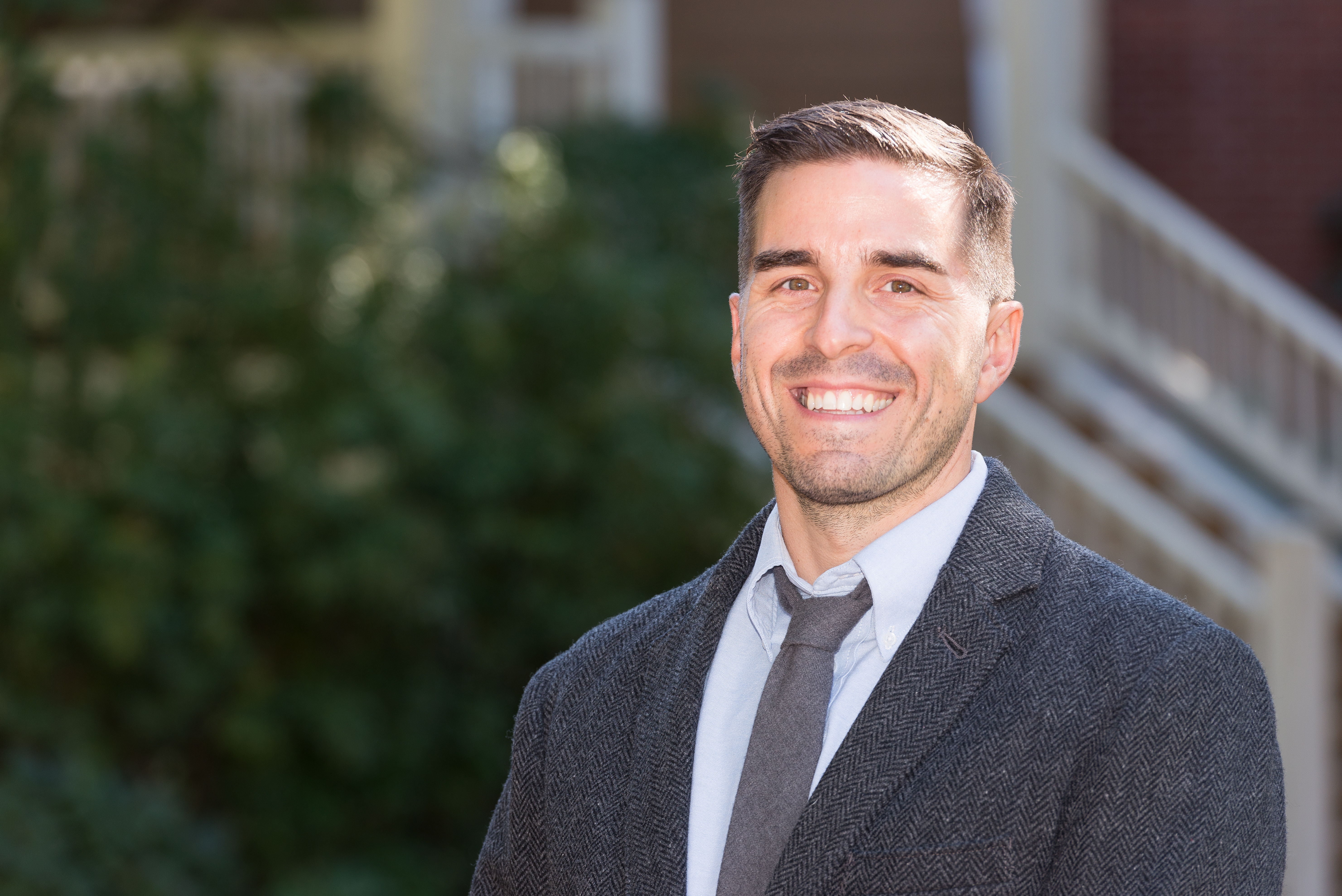
Dr. Joseph F.T. Nese was recently promoted to the rank of Research Associate Professor by the University of Oregon.
Joe, who graduated in 2009 with a Ph.D. in School Psychology from the University of Maryland, initially came to work at BRT as an IES Post-Doctoral Fellow. His work was so impressive that he was offered full-time work as a Research Associate as soon as his Fellowship ended.
In addition to being the Principal Investigator on an Institute of Education Sciences (IES) funded grant to develop computerized oral reading fluency ($1,599,289 from 2014-2018), Joe has been awarded numerous smaller grants, including a 2018 Professional Development grant and a 2014 Idea Award, both from the University of Oregon, and a 2015 Early Career Research Award from the Society for the Study of School Psychology. He served as the Data Coordinator and Project Manager for the National Research and Development Center on Assessment and Accountability for Special Education Students (NCAASE) from 2011-2018. He is currently Key Personnel on two IES-funded grants: Project DATA for RTI: Developing Adept Teams for Advancing RTI and Development of an Instructional Alternative to Out-of-School Suspensions.
A prolific author, Nese has published 19 articles in peer-reviewed journals including Journal of Positive Behavior Interventions, Educational Assessment, Journal of School Psychology, Journal of Special Education, Behavioral Disorders, Learning and Individual Differences, Journal of Educational Psychology, Education Policy Analysis Archives, Assessment for Effective Intervention, Remedial and Special Education, Exceptional Children, School Psychology Review, Reading and Writing, and The Elementary School Journal. An article he co-wrote was named 2013 Article of the Year for Assessment for Effective Intervention.
He has also published 17 technical reports and briefs and has 55 national research conference presentations to his credit.
“Joe is an incredible asset to the University of Oregon and to BRT,” remarked BRT co-Director Julie Alonzo, Ph.D., “He is intelligent, clear-thinking, compassionate, and an incredibly hard worker. I particularly value his integrity, both as a researcher and as a person.”
Dr. Nese’s promotion to Research Associate Professor is a testament to his contributions to the field. We feel quite fortunate to have him as part of the BRT research team.
Daniel Anderson Promoted to Research Assistant Professor
June 2018
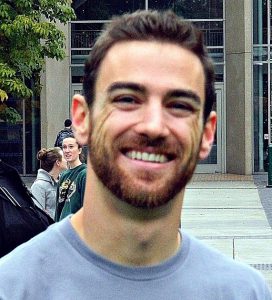
Daniel Anderson, Ph.D., has been a mainstay of the research team at Behavioral Research and Teaching since 2009, when he was hired as a Research Assistant soon after earning his Masters from the University of Oregon’s Educational Leadership program. Over the years, he has steadily progressed in both his expertise and his contributions not only to BRT but to the field of educational research more generally, moving from Research Assistant to Research Associate, and most recently, to the rank of Research Associate Professor.
Dr. Anderson was one of the first University of Oregon faculty to embrace the statistical computing language R, which he has used to great success in vertical scaling initiatives for the Florida Center for Research in Science, Technology, Engineering and Mathematics, as well as for the University of Oregon’s Early Childhood CARES, and the statewide large-scale alternate assessments for students with significant disabilities in Pennsylvania, Alaska, and Oregon.
In addition, Dr. Anderson was the first to teach R classes at the University of Oregon, helping to mentor graduate students and faculty alike through the steps of adopting this data analytic tool. His efforts in this area were recently recognized when he was appointed to develop and teach the College of Education’s first three courses on data science.
Dr. Anderson has had ten articles published in peer-reviewed journals, with four additional submissions currently under review. He has made 27 presentations at National and International research conferences and has published 54 technical reports.
Most recently, Dr. Anderson was honored at the 2018 American Educational Research Association for his outstanding service as a peer reviewer for the journal Educational Researcher.
Congratulations, Dr. Anderson, on your promotion. We look forward to continuing to celebrate your successes for years to come!
Shawn Irvin Promoted to Research Assistant Professor
June 2018

In recognition of his increased presence as a researcher with an independent line of research, P. Shawn Irvin, Ph.D., was recently promoted to the rank of Research Assistant Professor. Dr. Irvin first started working for Behavioral Research and Teaching (BRT) at the University of Oregon as a doctoral student, where he quickly took the lead on several large research projects. He earned his Ph.D. from the University of Oregon in 2015 and was asked to continue on at BRT as a Research Associate.
While still a graduate student employee, Dr. Irvin led a large team of researchers and practitioners through the process of item development, managing item development for an array of accessible reading comprehension, vocabulary, and mathematics measures aligned with the Common Core State Standards. These CCSS measures are now a cornerstone of the easyCBM assessment system, widely used across all 50 states as well as in many international locations.
Dr. Irvin also assumed responsibility for running a variety of alignment studies, working closely with the computer programmers at BRT to refine an online tool for conducting such studies. This tool, the Distributed Item Review (DIR), has since been used to support several states’ large-scale assessment programs, as well as in a variety of research contexts both at the University of Oregon and at other campuses across the country.
He has contributed significantly to several states’ large-scale assessments for students with significant disabilities, working closely with field-based practitioners as well as other researchers to develop, pilot, refine, deploy, and document the technical adequacy of assessment items to assess students with significant disabilities’ understanding of science, English language arts, and mathematics.
Dr. Irvin has played a key role on Institute of Education Sciences (IES)-funded grants focused on teacher professional development in the area of using student data for improving student learning outcomes and measurement development. In addition, he has made important contributions to Office of Special Education Programs (OSEP)-funded grants focused on statistical modeling of status and growth in reading, math, and science for students with disabilities and pre-school educator use of student data to drive instructional decision making.
In between running studies and mentoring students, Dr. Irvin has published eight articles in peer-reviewed journals and 30 technical reports. He has also shared his research through 15 presentations at national research conferences.
Recently, Dr. Irvin began has started to seek external funding to expand BRT’s focus to include K-12 science education, with grants submitted to both NSF and IES. We are excited about the future opportunities such grant applications will bring and delighted that Dr. Irvin’s contributions have been recognized by the University with this promotion.
Daniel Anderson, Ph.D., Star Reviewer!
March 2, 2018
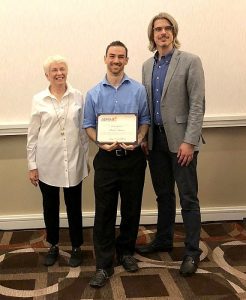
BRT Research Associate Daniel Anderson, Ph.D., will be honored at the 2018 Annual Meeting of the American Educational Research Association (AERA) for his outstanding service as a peer reviewer for the journal Educational Researcher.
Dr. Anderson began working for Behavioral Research and Teaching soon after graduating with his Master’s degree from the University of Oregon in 2009 and has been an integral part of the BRT team ever since. He earned his Ph.D. in 2015 and subsequently completed a one-year postdoctoral experience at the Center for Teaching and Learning, before accepting a position at BRT once more.
His service in BRT has included managing Institute of Education Sciences grant-funded projects, providing statistical and psychometric assistance developing and scaling both statewide alternate assessments for students with significant disabilities and Curriculum-Based Measures in mathematics and literacy, and mentoring colleagues and graduate students interested in learning how to use the statistical software R.

Dr. Anderson has published nine peer-reviewed journal articles and a book chapter as well as 54 technical reports. In addition, he has made 25 presentations at major research conferences.
Dr. Anderson reviews articles for the following journals:
- Educational Researcher
- American Educational Research Journal
- Reading Research Quarterly
- Remedial and Special Education
- Educational Assessment
- Studies in Educational Evaluation
- Language Testing
Being selected by Educational Researcher as one of their 2017 Outstanding Reviewers is a tremendous honor, as it reflects consistent high-quality feedback in the reviewing process. The peer-review process is an integral part of ensuring that published research meets strict scientific standards. We’re proud that Dr. Anderson’s contributions are being recognized so publicly.
Huna Yim-Dockery to Complete her Association of Psychology Postdoctoral and Internship Centers (APPIC) Internship at the Hawai‘i Psychology Internship Consortium
March 1, 2018

Huna Yim-Dockery will be completing her Association of Psychology Postdoctoral and Internship Centers (APPIC) internship at the Hawai‘i Psychology Internship Consortium (HI-PIC). She will specifically be working with the Hawai‘i Department of Education, serving the West Hawai‘i school district in Kona, Big Island.
She will be providing behavioral and mental health services (individual and group) to public school students from Kindergarten to 12th grade demonstrating a wide-range of social, emotional and behavioral diagnoses and difficulties. Her focus will be on behavioral health interventions in schools including individual and group counseling, in-class support, functional behavioral assessment, development of behavioral support plans, and family-school based consultation.
She will also be providing comprehensive psychological evaluations that include a cognitive, academic achievement, adaptive behavior and social-emotional/behavioral assessment to further inform the team about the student’s individual strengths and needs.
She is super excited for this big transition and looks forward to the training and experience that she will gain through this internship match!
The Behavioral Research and Teaching team is extremely proud and happy for Huna. Congratulations on a job well done and continued success in your new venture.
Celebrating 25 years at BRT
February 8, 2018
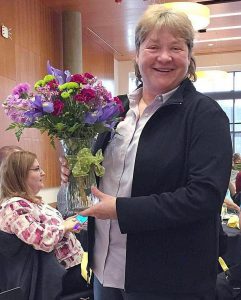
Denise Swanson: On a fateful spring day in 1991, a mutual friend introduced me to Dr. Gerald Tindal. As luck would have it, I was in need of work and Jerry was in need of someone to do data collection. It was a chance meeting that would begin not only a great working relationship but blossom into a wonderful opportunity to be part of a new and growing team of researchers.
Fast forward twenty-five years and I am still working with Jerry Tindal and am now part of a phenomenal group of people who comprise Behavioral Research and Teaching here at the University of Oregon.
It has been a fantastic journey of growth and learning and I look forward to more years to come. I consider it a gift to have started on the ground floor of such an impressive research program and even more blessed to work with the most amazing group of people I call my family.
Graduate Employee Josh Kahn Receives Betty Foster McCue Scholarship

BRT Graduate Employee Josh Kahn was recently awarded a Betty Foster McCue Scholarship by the University of Oregon Graduate School. This award recognizes doctoral candidates in the final year of their doctoral programs whose dissertations focus on topics related to human development and performance.
Josh’s dissertation focuses on the development and validation of a measure of Administrative Decision-Making in Student Discipline (ADMin-SD). Previous research has demonstrated that students are not disciplined equitably, with Black students facing harsher consequences for similar infractions compared to their White counterparts. Currently, no measures exists to evaluate whether training programs or interventions can improve administrators’ decision-making skills related to student discipline. ADMin-SD, a test of an administrator’s ability to make effective, efficient, and equitable decisions in student discipline situations, can be used by both practitioners (e.g., district administrators’ evaluation of principals’ need for further professional development) and researchers (e.g., to study how and why principals make decisions in student discipline situations). ADMin-SD will allow the field to begin developing and testing interventions with the ultimate goal of helping improve administrators’ decision-making skills.
Josh began his doctoral studies at the University of Oregon in the fall of 2011 and is currently finishing his second year as a graduate employee at BRT, where he has been an integral part of Dr. Joseph F. T. Nese’s Project CORE, Computerized Oral Reading Fluency Evaluation, a four-year research project funded by the Institute of Education Sciences (R305A140203). Josh’s work on Project CORE has included coordinating data collection efforts in the schools as well as managing and analyzing project data and assisting in dissemination of results.
Prior to joining BRT, Josh worked as a middle school English teacher and a special education teacher at the elementary, middle, and high school levels. He has experience working with students with both high- and low-incidence disabilities. He received his M.S.Ed in Elementary Education from Mercy College as part of his participation in the New York City Teaching Fellows, where he taught special education in the Bronx, NY.
Josh’s primary research interests include:
1. teacher instructional decision-making,
2. applying insights from cognitive psychology to administrative decision-making, and
3. leveraging various problem-solving models.
Josh expects to defend his dissertation by winter of 2018 and will begin teaching as an adjunct member of the Moravian College faculty in Pennsylvania in the fall.
Congratulations on a well-deserved award, Josh!
There’s a New Doctor in the House

BRT would like to congratulate Dan Farley on successfully defending his dissertation and earning his Ph.D. on March 2, 2017. Dr. Farley has worked closely with BRT since 2011, when he was hired to manage our work related to the Oregon Extended Assessment for the Oregon Department of Education.
Dr. Farley’s dissertation aligns closely with his previously published articles, among them a 2016 manuscript published in Exceptional Children and another 2016 article in Journal of Special Education, both of which examine the relationship between assessments and students with significant disabilities.
In his dissertation, Dr. Farley addressed a need identified by statewide accountability programs for modeling growth for students with significant cognitive disabilities (SWSCD) who take alternate assessments based on alternate achievement standards (AA-AAS), an approach that has been widely adopted for use with students taking general assessments. He used latent growth curve modeling to define growth estimates based on exceptionality, sex, race, and economic disadvantage, and then unconditional latent class growth analysis (LCGA) to determine the number of homogeneous subgroups that existed within the heterogeneous population of SWSCD for subsequent growth mixture modeling (GMM). Dr. Farley used unconditional GMM to define the number of homogeneous subgroups of students with similar intercept and growth patterns within the overall population of SWSCD, and then discriminant function analysis (DFA) including student exceptionality, sex, race, and economic disadvantage status to analyze class membership post hoc.
In his work, Dr. Farley notes that researchers have elaborated a number of challenges in modeling growth for students taking an AA-AAS, including test scaling, group heterogeneity, small sample sizes, missing data, and the use of status-based assessments that were not designed to measure a developmental continuum. His study addressed these challenges, but did not fully eliminate or solve them.
Dr. Farley found that SWSCD with different exceptionalities generally had significantly different average initial achievement but growth rates that did not differ significantly from each other. SWSCD classified as economically disadvantaged performed significantly lower than their peers in initial achievement, yet exhibited growth rates that were not statistically different than the reference group. In his study, he also found evidence for two separate latent classes of students with exceptionalities on the Oregon AA-AAS. The first class had lower achievement and larger growth rates, while the second class had higher achievement and slower growth rates. Students identified as SLD and CD were generally higher-performing, while students identified as ID, ASD, and OI were lower performing across all analytic models.
Dr. Farley will continue his work on the Oregon Extended Assessment as well as taking on additional project responsibilities within Behavioral Research and Teaching.
BRT Researcher, Leilani Sáez, Promoted to Research Assistant Professor
September, 2016
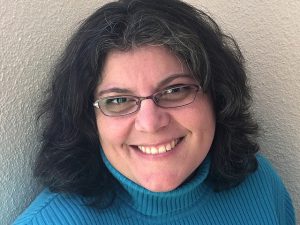
The University of Oregon recently recognized Dr. Leilani Sáez’s contributions to research and practice with a promotion to the Research Professor ranks. “The promotion marks an important milestone for Dr. Sáez here at UO in that it moves her to the most prestigious of trajectories available for career NTTF research faculty,” explains BRT Co-Director Julie Alonzo. “Leilani’s work as Principal Investigator on Project Iceberg and the pivotal role she has played in the development of the Learning Receptiveness Assessment, as well as her success publishing in peer-reviewed journals and presenting at well-respected research conferences were among the many reasons she was successful in being moved to the Research Professor ranks.”
Dr. Sáez obtained her Ph.D. in Educational Psychology from the University of California, Riverside (2004), with an emphasis in cognitive processing and learning disabilities. Her research focuses on the interaction between student cognitive functioning, classroom behaviors, and academic skill level contributors to learning difficulties. She has written and presented on reading skills development and measurement, and the impact of working memory functioning on achievement.
Prior to joining BRT, Leilani led the development of a K-12 comprehensive reading assessment system, instructed pre- and in- service K-12 teachers, and taught students with learning disabilities. Currently, she is developing a tablet-based Learning Receptiveness Assessment (LRA) tool designed to screen early risk for learning difficulties through a multi-time point measurement of emergent academic skills, learning-supportive behaviors, and working memory cognitive functioning. She is currently in the second year of a five-year OSEP-funded project using the LRA to develop implementation strategies and resources for facilitating data-based decision-making to prevent reading disabilities across the preschool-kindergarten transition.
“Leilani is one of the strongest project managers I’ve ever met. She is incredibly well-organized, detail-focused, and committed to quality,” adds Dr. Alonzo. “We are very fortunate to have her as part of the BRT team.”
Congratulations, Leilani, on your recent promotion!
BRT Employee Receives Campus-Wide Recognition
August 26, 2016
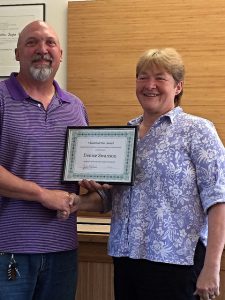
Denise Swanson, BRT’s most senior employee, was one of only five people campus-wide to be awarded a 2016 Classified Star award in recognition of her outstanding service to the University of Oregon.
The Classified Star awards are presented by the Classified Staff Training and Development Advisory Committee in partnership with the Office of the President and Department of Intercollegiate Athletics and are intended to recognize classified employees who go “above and beyond” in their work at the UO.
Denise’s nomination emphasized her leadership role in supporting a positive work environment in BRT as well as her long-standing contributions to the wider UO community through her service to the women’s basketball team and the care with which she helps ensure the BRT offices and the campus as a whole reflect positively on the University. “Denise is focused on doing her job really well and is always willing to step in to help on projects. She is my go-to person when it comes to getting detailed projects that require a lot of coordination done,” explained BRT Co-Director Julie Alonzo. “But what makes Denise really stand out is that she is also deeply concerned with making sure the work environment is supportive and positive. Whether it’s organizing a birthday celebration, hosting a baby shower, helping someone move, or rallying the troops to support other members of the BRT team when they are in need, Denise is always front and center, going above and beyond to help make BRT a really special place to work.”
In the decades in which she has worked for BRT, Denise has worn many hats, all of them well. Before online assessment became the norm, she was responsible for creating scan sheets to support three local school districts in their three-times-a-year assessment of all K-8 students in reading and mathematics and processing the students’ answer sheets quickly and accurately each fall, winter, and spring. When the easyCBM assessment system began to be offered to districts outside the local area, she headed up customer support for years, and she is still an integral part of the customer support team. Most recently, she has accepted the challenge of developing and maintaining websites for her research unit, including the main BRTProjects.org website, which provides an important introduction to the work being conducted.
“Denise is the GOAT [‘greatest of all time’],” enthused Research Assistant Professor Joseph Nese. “She always goes the extra mile to support everyone, both inside and outside the office.”
Research Associate Shawn Irvin added, “She’s simply an amazing colleague and friend—one of the best people at UO or anywhere else.”
Congratulations, Denise, on this very well-deserved honor!
U of O Recognition College of Education Recognition
BRT Projects and Personnel Manager, Awarded the U of O College of Education’s 2016 Officer of Administration Award
May 17, 2016
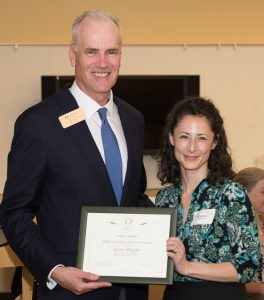 The award places Raina Megert in an elite group of University of Oregon employees who have been recognized for their outstanding service to students, the College, and/or state and community partners. Raina’s nomination mentioned the essential role she plays in the $12,000,000 National Center on Assessment and Accountability for Special Education (NCAASE), an IES funded center which has required her to work with personnel from four state educational agencies, a non-profit testing agency, Arizona State University, the University of Oregon, and individuals from across the country who serve as consultants or as part of an Advisory Board. In addition, her work managing the internal accounts at the University of Oregon, including assisting with financial tracking, intellectual property transfer and trademark agreements, and setting up and managing the financial arrangements for the easyCBM Deluxe Edition, released in the fall of 2015, was commended. Another area in which Raina’s work was lauded was the interaction between BRT and the Oregon Department of Education. The nomination letter noted that since 1999, BRT has been the primary test vendor for the state’s Alternate Assessment, a large-scale high-stakes assessment aimed ant including students with significant cognitive disabilities in statewide testing programs. The nomination form ended with the following paragraph:
The award places Raina Megert in an elite group of University of Oregon employees who have been recognized for their outstanding service to students, the College, and/or state and community partners. Raina’s nomination mentioned the essential role she plays in the $12,000,000 National Center on Assessment and Accountability for Special Education (NCAASE), an IES funded center which has required her to work with personnel from four state educational agencies, a non-profit testing agency, Arizona State University, the University of Oregon, and individuals from across the country who serve as consultants or as part of an Advisory Board. In addition, her work managing the internal accounts at the University of Oregon, including assisting with financial tracking, intellectual property transfer and trademark agreements, and setting up and managing the financial arrangements for the easyCBM Deluxe Edition, released in the fall of 2015, was commended. Another area in which Raina’s work was lauded was the interaction between BRT and the Oregon Department of Education. The nomination letter noted that since 1999, BRT has been the primary test vendor for the state’s Alternate Assessment, a large-scale high-stakes assessment aimed ant including students with significant cognitive disabilities in statewide testing programs. The nomination form ended with the following paragraph:
“These three areas are only part of the story, as she is also critical in other research grants and work within BRT that reflect well on the College of Education. In summary, Raina Megert deserves recognition from the College of Education for her important administrative functions; she accomplishes them with proficiency and efficiency. She is positive with people, responsible in follow through, and one of the best ambassadors of COE to other offices in the UO as well as agencies across the state and nation.”
Raina Megert, from all of us at BRT, we send you a hearty congratulations on a well-deserved award!
BRT Research Assistant Advances to Doctoral Candidacy
May 17, 2016

BRT Research Assistant Dan Farley, who heads up our work on Extended Assessments for students
with significant disabilities, successfully presented his dissertation proposal on May 5, 2016. This is the next-to-last step in his journey toward earning the coveted Ph.D. in Educational Methodology, Leadership, and Policy from the University of Oregon. Dan anticipates defending his dissertation in 2017. His study will focus on modeling growth for students with significant cognitive disabilities (SWSCD). This is an area of study complicated by test scaling, missing data, group heterogeneity, and small sample sizes. In his dissertation study, Dan is proposing to address some of these challenges by modeling achievement and growth for students in multiple exceptionality categories while controlling for missing data and test switching patterns during multiple imputation. If growth variance is significant, he will use growth mixture modeling to determine whether there are homogeneous subgroups of students with similar intercept and growth patterns within the overall population of SWSCD. In addition, he will use students’ sex, race, ethnicity, and socioeconomic status in model building and to analyze class membership post hoc.
Dan’s recent publications include:
Tindal, G., Nese, J. F. T., Farley, D., Saven, J., and Elliot, S. (2016). Documenting reading achievement and growth for students taking alternate assessments. Exceptional Children, 1-16. doi: 10.1177/0014402915585492. ecx.sagepub.com/content/82/3/321
Saven, J. L., Anderson, D., Nese, J. F. T., Farley, D., & Tindal, G. (2016). Patterns of statewide test participation for students with significant cognitive disabilities. Journal of Special Education, 1-12. doi: 10.1177/0022466915582213. http://sed.sagepub.com/content/49/4/209.short
Anderson, D., Farley, D., & Tindal, G. (2016). Test design considerations for students with significant cognitive disabilities. Journal of Special Education. 49, 3-15. doi: 10.1177/0022466913491834. http://sed.sagepub.com/content/early/2013/06/24/0022466913491834.abstract
Congratulations, Dan!

